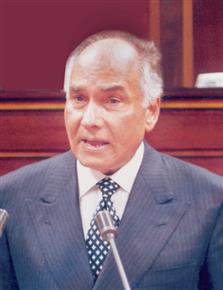Smuggling Knocks Textile and Yarns Industry on the Head

.Smuggling Knocks Textile and Yarns Industry on the Head
Shura Council Energy and Industry committee chaired by Mohamed Farid Khamis agreed upon the necessity of establishing precise mechanisms to abolish the smuggling phenomenon which catastrophically endangers the textile and yarns industry. During the meeting, Khamis and the other members emphasized that smuggling operations signify a sharp decline in the local industry and bankruptcy of many factories which result in discharging a great number of employees.
Khamis assured that the federation of Industry and textile manufacturers would be invited to another meeting to formulate common vision and definite demands which would be approved by the Shura and the people>s councils in order to be shortly applied to avoid further loss.
Galal El- Zorba, chief of the federation of Egyptian Industries, clarified that in addition to the consequences of smuggling on the local market, the industry is threatened by other fatal problems arising from expansion in importation and abrogation of tax exemptions which in their turn overburdened the manufacturers.
Amr Asal, chief of the Industrial Development Organization stressed that the organization managed to completely ban the illegal factories; thus only factories which have industrial register shall be allowed to import within their operative capacity and the quantities already registered. He added that great efforts are exerted together with the High Textile Council to unify and simplify the specifications of the textile and yarns products to the greatest extent.
Galal Abu El Fotooh, advisor of Minister of Finance, revealed that satellite surveillance systems would be adopted by the Ministry of Finance with the purpose of chasing smugglers in order to be arrested and penalized. He added that the Customs Department is adhered to the guiding prices submitted by the manufactures for the imported products but those prices would be revised and adjusted in a way to satisfy both manufacturers and merchants.
Mohamed El Morshedy, Chief of the Textile Chamber called for the inevitability of importing yarns and textiles for the Free-Zone factories and applying the temporary allowance system in accordance with the industrial register and the operative capacity of the factories, as a positive step to combat smuggling.
Said Abu-El-Qumsan, advisor of the Minister of Trade and Industry stated that the current procedures are forbidding, but lack of discipline in the local trade and spread of random districts lead to smuggling; a matter which obligates keeping all within bounds. Abu-El-Qumsan highlighted that developing and promoting the local industry besides providing commodities with recognized specifications at adequate prices would be among other elements necessary for combating smuggling.
Alaa Arafa, the chief of the Council of Exporting Yarns & Textile claimed that smugglers> names should be announced. He indicated that smuggling operations endanger the national security and consequently the Minister of Interior should interfere. Major Mohammad Abu-Shadi, Interior-Trade Sector Director- disclosed that more than 3000 smuggling cases are registered within a year, and concluded that the stores of the Ministry are not enough to contain all the confiscated items.
On the other hand, Magdi Abaza, chief of the Free-Zones of the Investment Organization stated that 209 projects of yarns, textile and ready=made clothes are operated within the Free-Zones system, employing 120 thousand workers, whose exports amount to 1.4 Milliard American dollars and their imports amount to 950 million dollars in addition to a purchase-power of local raw material for 184 million dollars.
Mohsen El-Jilani, chairman of cotton , textile and clothing holding company assured that the guiding prices play an important role in combating smuggling.

